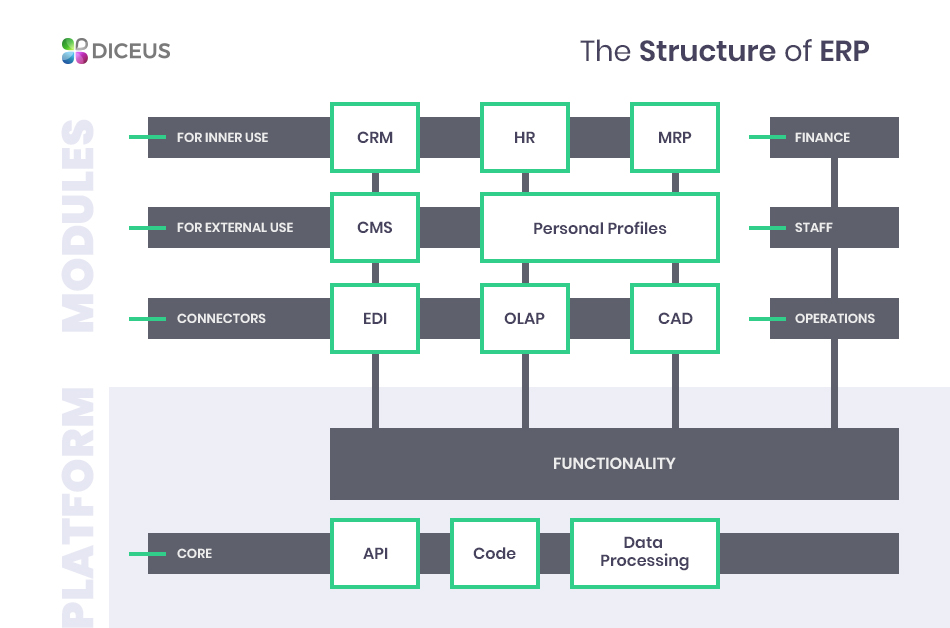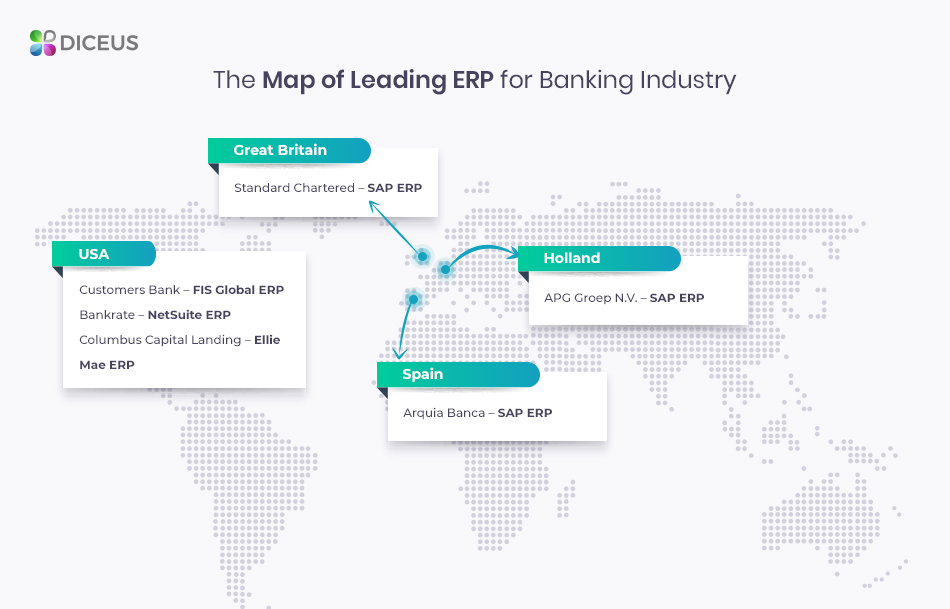

Everything you should know about ERP for banking industry
With constant modernization and digitization, present-day businesses realize the importance of proper managerial solutions for internal use. Even medium and small companies implement such products, not to mention large corporations. Currently, ERP (Enterprise Resource Planning) systems represent the most popular approach to maintain in-house business processes and to gather, store, and interpret data. Emerged as manufacturing software, the mentioned applications are widely used in every modern industry now. Particularly, entrepreneurs appreciate ERP for banking industry.
Financial facilities require a high level of security and streamlined reliable workflows which prevent even the smallest potential errors. If you consider the possibility of deploying ERP for your company, it’s better to clarify definitions and features, so you will be able to choose the best product. We will begin with some general data and then move to unique stuff related to banks.
ERP definition, origin, and expansion
It’s not an easy task to define what ERP is exactly because this marketing term consists of two parts:
- A strategy. Here, ERP is a managerial approach to organizing core processes inside the company’s internal system.
- An application. ERP is a category of software which helps to enforce the aforementioned strategy.
Simply put, the current conception of ERP recognizes it as an information system to store and process large packages of crucial company’s data. Hence, ERP software for banking industry focus on key processes such as financial transactions, protecting clients’ sensitive info, connecting multiple departments etc. It’s important to note that such solutions barely can handle literally all business tasks because this leads to great implementation costs and difficulty. Thus, you should define the essential things to gather them into a single solution. Our company can help with this stage by providing comprehensive business analysis.
The basic idea behind ERP was introduced by the Gartner Group in 1990. First solutions were designed to manage manufacturing processes using actual software. Due to the Y2K problem, many companies decided to replace their outdated platforms with ERP in the late 1990s. While traditional products were focused on back-office tasks, further development introduced front-office features of ERP: e-commerce practices, communication with clients, CRM apps. In the XXI century, web ERP for banking industry and other sectors appeared to facilitate the collaboration of different enterprises via the Internet.
Need more info on interaction between ERP and CRM? Find out how we combine these applications with each other!
Basics of ERP software for banking industry
Similarly to other companies, financial corporations began implementing ERP apps in the early 2000s. Now, some banks use basic systems with slightly modified modules but more businesses migrate to customizable products which suit current demands for security, data processing, and money control. Banking consists of exclusive customer-related activities such as deposits/credits, cash transactions, and digital money flow, so facilities have to build their reputation to attract and retain clients. Faults are simply unacceptable.
Further, we want to cover the major features of ERP software for banking industry: characteristics and modules.
Necessary characteristics
To start with, let’s look at key operational principles of decent apps. They must be:
- Integrated. A single database and working ecosystem should include the chosen core business processes regardless of the company’s complexity. Thus, ERP helps big banks to gather valuable data with simplified subsequent processing and analyzing.
- Unified. Respectively, local or web ERP for banking industry should smoothly work with different applications. Ideally, every bank’s branch has quick access to the global ERP solution, so local and chief managers can easily track performance.
- Real-time. The fast-changing finance sector requires equally fast response from institutions. During the 2008 financial crisis, banks with quick reaction were able to cut insane losses while sluggish ones were destroyed totally.
- Multilanguage and multicurrency. This part is extremely essential for transnational financial enterprises. Good solutions support several accounting and tax schemes, currencies, languages etc.
Additionally, the most traditional approach to ERP for banking industry provides for ready-made replicable solutions. In other words, developers prefer to create universal systems which suit miscellaneous organizations with different preferences and extensions. Replicable ERP software is convenient because it allows integrating best practices.
However, banks may require unique custom platforms for managing and protecting sensitive data. Our team deploys tailored solutions for different enterprises including financial ones because we prefer a personalized approach with solid analysis. We are more technology partners rather than freelance developers, so we guarantee quality and timeliness.
ERP modules
Regardless of the chosen product type (premade or custom), you will get a system which consists of several modules. Usually, ERP software for banking industry also features these parts. Some of them are core and obligatorily while others come like switchable elements which you can enable or disable independently. Traditional ERP is based on its platform divided into:
- Core. The framework which acts as a basement for extensions. It also includes APIs, codes, and data processing methods.
- Functionality. The underlying tools which are necessary for all companies. This part can’t be disabled like more specialized elements.
Over the platform, there are modules. Earlier, ERP for banking industry featured a lot of tools including CRM, PPM, PLM, and so on. Nowadays, they come as separate solutions integrated for an extra price. Hence, modern ERP covers more internal processes and tasks rather than communications with clients. Modules divide into the next parts:
- Finance. Banks are interested in the general ledger, debit and credit accounts, tools for managing cash flows, liquidity, investments, and risks.
- Staff. This category is pretty universal for any company as it facilitates employees’ hiring, training, evaluating, and compensating.
- Operations. It’s the most valuable part as it stands for delivering core services. Banks need proper process manufacturing, planning, and distributing their business.
Apart from this classification, general ERP elements may be for inner use (designed for employees: accounting, manufacturing) and for external use (designed for clients: CMS, personal profiles). Finally, there are connectors which care about the interaction between ERP and non-ERP systems used in the enterprise.
The overall scheme may look a bit complicated but remember that you can add and remove everything when you order a customized local or web ERP for banking industry. Even the basic functionality can be easily modified according to the bank’s goals and needs.

Pros and cons of ERP solutions
First and foremost, ERP is the way to combine all essential business processes in a single powerful system. There are tons of advantages, so check the most valuable ones which are perfect for banks:
- Easy access to financial data. It’s enough to input information once to make it available for everyone with permissions. Such data come without extra revise.
- Communication between branches. ERP software for banking industry connects all departments and greatly facilitates workflow.
- Control and monitoring. While everything is tracked by machines, it becomes really simple to check staff performance or business processes’ current states.
- Much fewer human-related errors. The global ecosystem eliminates the possibility of missing transactions, forgotten accounts or technical distortions.
On a par with strengths, there are always some weaknesses. They are strongly linked with advantages and, thus, are inevitable:
- Dependence on hardware. Stand-alone products can’t work without solid servers. However, SaaS web ERP for banking industry is less demanding.
- Complicated system of permissions. Banks have to control security and create different access levels for different employees. It may be difficult for large corporations.
- High costs of implementation and switching. Again, fully-functional ERP with a lot of modules is expensive as you have to install it and train workers.
Tips on choosing ERP software for banking industry
To start with, there are numerous developers of ERP applications. In 2017, the top 10 of them covered around 31.7% of the global ERP market. Furthermore, the industry was worth $82.6 billion and it was predicted that it will be $85.9 billion in 2022. The majority of leading companies focuses on ready-made solutions which feature best practices suitable for any industry. If you are ready to work with a predefined set of tools and modules, pay attention to teams like SAP, Oracle or Microsoft.
Some notable banking corporations rely on the described preprogrammed solutions. Just take a look:
- Standard Chartered (the UK, 86,000 employees) – SAP ERP.
- APG Groep N.V. (Netherlands, 4,000 employees) – SAP ERP.
- Customers Bank (the USA, 822 employees) – FIS Global ERP.
- Bankrate (the USA, 384 employees) – NetSuite ERP.
- Columbus Capital Landing (the USA, 195 employees) – Ellie Mae ERP.
- Arquia Banca (Spain, 170 employees) – SAP ERP.

How custom solutions overcome ready-made alternatives
The problem of the aforementioned examples is hidden in the generalization. Ready solutions are poorly customizable because each unusual module imposes additional costs. It means that tailor-made products are more efficient because they feature only the necessary functions and are developed for your company exclusively.
Before ordering a custom ERP solution, be sure to consider necessary points:
- Key goals of software. Define what exactly the launched app will handle. Banks should be interested in controlling financial flows, accounting, protecting the customers’ sensitive data, and connecting different branches in the single network.
- The company’s core processes. Similarly, remember about your business processes. Say, small banks can order a simple basic ERP with accounting/cash managing tools while transcontinental enterprises will need various tax rules, currencies, and departments.
- Platforms to work on. Think how applications will be deployed. Usually, companies order stand-alone or SaaS solutions for launching on desktop clients. Sometimes, you will need mobile applications for more flexible control.
- The budget. Finally, ensure that you can afford to spend enough money. It happens that clients want large functional packages when they actually don’t need some features from them. For this, we launch an MVP to show how tech works.
What are primary questions to ask yourself about providers
After you are done with the previous stuff, proceed to the final stage and choose a team which will develop and integrate the product. Be sure to find developers which will be able to launch the most suitable ERP for your business. For this, we recommend asking yourself a few questions which should facilitate the selection process:
- Are developers experienced? Look for teams which have enough knowledge in the chosen industry. To evaluate vendors, you can look at their previous projects: ones with positive clients’ reviews and proven efficiency are successful.
- How developers organize their work? Companies which utilize the Agile methodology and deliver MVP before charging the full cost of ERP deserve your attention, definitely. It’s better to ask about these processes personally to avoid miscommunications.
- Which technologies they use? For example, .NET, Python, Java are best practices for back-end solutions while Angular and jQuery are good for front-end. Additionally, knowledge of SQL, Azure, and Oracle is important for developers.
- On which pricing model they are focused? Hourly rates are typical for freelance developers but advanced outsourcers prefer quote prices which are set for each project independently. Thus, you can be sure that no hidden fees will be added further.
Our company has rich experience in creating ERP systems for various teams including banks. We have some use cases with leading national and global companies for which we have designed and launched:
- Comprehensive data warehouses with end-to-end flows featuring basic tools like general ledgers and more advanced options such as business rules or COTS systems.
- Online banking applications for mobile gadgets through which customers can access their wallets and transactions. We also have worked on bigger projects for web-systems with implementation of personal accounts, credits/deposits, and currency exchanges.
- FinTech systems based in cloud or deployed on clients’ servers. These projects were focused on accounting, analytics, and data visualization with high level of automation.
Are you ready to purchase an ERP system? Here’s the info on ERP implementation by our devs.
Your perfect ERP
If you consider the option of implementing ERP for your bank, feel free to contact our team to get first consultation. Just contact us and we will provide all the detailed info about our versions of ERP software for banking industry, the whole development process, and important things for your business exclusively.





